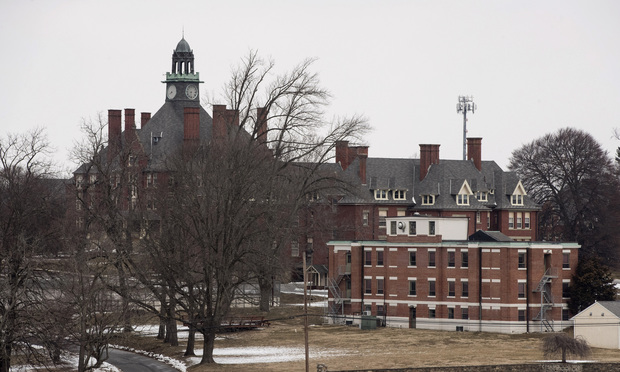Glen Mills Victims Seek Mass Tort Status in Philadelphia Common Pleas Court
As of the filing, 15 cases had been lodged against Glen Mills alleging abuse, but, according to Eisenberg Rothweiler's Nancy Winkler, the firm has 360 clients preparing to file suit.
February 05, 2020 at 04:21 PM
5 minute read
 Glen Mills Schools in Glen Mills, Pennsylvania. Photo: AP/Matt Rourke
Glen Mills Schools in Glen Mills, Pennsylvania. Photo: AP/Matt Rourke
Attorneys representing hundreds of former students claiming they were physically and in some cases sexually abused while at the shuttered Glen Mills Schools have asked the Philadelphia Court of Common Pleas to consolidate the litigation into a mass tort.
The move would create a competing consolidated litigation as two other suits are seeking class action status in federal court.
Attorneys with Eisenberg, Rothweiler, Winkler, Eisenberg & Jeck have filed a letter to the First Judicial System's Administrative Judge Jacqueline Allen saying the move would be in the best interest of all the parties and the court.
As of the filing, 15 cases had been lodged against Glen Mills alleging abuse, but, according to Eisenberg Rothweiler's Nancy Winkler, the firm has 360 clients preparing to file suit.
"In addition to the significant financial savings, consolidation of these cases for pretrial handling, including discovery and motions, will promote the convenience of the parties and efficiency during pretrial proceedings, duplication discovery will be eliminated, and there will be no risk of inconsistent judicial rulings," the letter sent to Allen on Tuesday said.
Dion, Solomon & Shapiro is co-counsel to Eisenberg Rothweiler, which has filed the majority of cases, but attorneys with Saltz Mongeluzzi Barrett & Bendesky and Murphy & Dengler have also filed suits over the alleged abuse.
Stradley Ronon Stevens & Young attorney Joseph McHale, who is representing Glen Mills Schools, also joined Eisenberg Rothweiler's request to have the cases consolidated into a mass tort program.
"I do believe that, in the interest of judicial economy, these should be designated as a mass tort," he said. "We don't believe that these cases should be class action cases. We believe they're individual cases."
McHale otherwise disputed the recitation of facts in Eisenberg Rothweiler's letter to Allen, and said the school, which currently does not have any students after the state pulled its licenses, is continuing to cooperate with government authorities.
The latest lawsuits come less than a year after an in-depth investigation by The Philadelphia Inquirer found systemic abuse at the reform school, where students were often placed after being found to be at risk for truancy, delinquency or criminal conduct. Subsequently filed court documents allege that the students suffered beatings by staff and fellow students and that many were additionally subjected to sexual abuse, including rape.
In the months following the paper's investigation, attorneys from Berger Montague, Dechert, the Juvenile Law Center and Saltz Mongeluzzi filed three lawsuits in federal court, each seeking to establish a class action against the school.
In early January, Saltz Mongeluzzi voluntarily dismissed its suit without prejudice, but a month before that, U.S. District Judge Harvey Bartle of the Eastern District of Pennsylvania had given the green light to the other two suits. In opinions on Dec. 17 and Dec. 19, he rejected arguments that the plaintiffs failed to state a claim and denied Glen Mills' motions to dismiss.
In January, Eisenberg Rothweiler announced that it had filed more than a dozen cases against the school over the abuse. Although the plaintiffs all suffered similar abuse, their claims are not identical. The plaintiffs also hail from across the country, and range in age from those who recently attended the school to those who attended in the 1980s.
Given that the plaintiffs did not suffer identical injuries, Winkler said her firm decided a mass tort would be a more appropriate means of suing the school.
"The plaintiffs all have injuries, but they don't have identical injuries. Some were physically abused, some were physically and sexually abused. All of these now men have an emotional component to it as well," Winkler said. "Because of that we think it really is ripe to be a mass tort."
Winkler said she does not anticipate any jurisdictional challenges, which often happen in pharmaceutical mass tort litigation. However, because Glen Mills is based in the area and it receives significant funding from Philadelphia, Winkler said state court jurisdiction is clear.
She also said that, although not all of the cases occurred within the traditional statute of limitations, recent state Superior Court precedent should allow those cases to move forward. In the case, Rice v. Diocese of Altoona-Johnstown, the Superior Court revived a decades-old claim based in part on the fact that a grand jury report outlined newly discovered information that the plaintiff—an alleged victim of sexual abuse by a priest—would not have been aware of before the statute of limitations expired.
According to Winkler, the statute of limitations for the older claims should be tolled until the Inquirer's investigation, which found not only abuse, but also allegations that there were efforts to cover up the abuse.
"We believe there is a strong case for fraudulent concealment," Winkler said. "We believe [the report] is the earliest possible trigger."
This content has been archived. It is available through our partners, LexisNexis® and Bloomberg Law.
To view this content, please continue to their sites.
Not a Lexis Subscriber?
Subscribe Now
Not a Bloomberg Law Subscriber?
Subscribe Now
NOT FOR REPRINT
© 2025 ALM Global, LLC, All Rights Reserved. Request academic re-use from www.copyright.com. All other uses, submit a request to [email protected]. For more information visit Asset & Logo Licensing.
You Might Like
View All
Pennsylvania Law Schools Are Seeing Double-Digit Boosts in 2025 Applications
5 minute read
Sanctioned Penn Law Professor Amy Wax Sues University, Alleging Discrimination
5 minute read
Pa. Superior Court: Sorority's Interview Notes Not Shielded From Discovery in Lawsuit Over Student's Death
3 minute read
LSAT Administrator Sues to Block AI Tutor From Using ‘Famous, Distinctive’ Test Prep Materials
3 minute readLaw Firms Mentioned
Trending Stories
Who Got The Work
J. Brugh Lower of Gibbons has entered an appearance for industrial equipment supplier Devco Corporation in a pending trademark infringement lawsuit. The suit, accusing the defendant of selling knock-off Graco products, was filed Dec. 18 in New Jersey District Court by Rivkin Radler on behalf of Graco Inc. and Graco Minnesota. The case, assigned to U.S. District Judge Zahid N. Quraishi, is 3:24-cv-11294, Graco Inc. et al v. Devco Corporation.
Who Got The Work
Rebecca Maller-Stein and Kent A. Yalowitz of Arnold & Porter Kaye Scholer have entered their appearances for Hanaco Venture Capital and its executives, Lior Prosor and David Frankel, in a pending securities lawsuit. The action, filed on Dec. 24 in New York Southern District Court by Zell, Aron & Co. on behalf of Goldeneye Advisors, accuses the defendants of negligently and fraudulently managing the plaintiff's $1 million investment. The case, assigned to U.S. District Judge Vernon S. Broderick, is 1:24-cv-09918, Goldeneye Advisors, LLC v. Hanaco Venture Capital, Ltd. et al.
Who Got The Work
Attorneys from A&O Shearman has stepped in as defense counsel for Toronto-Dominion Bank and other defendants in a pending securities class action. The suit, filed Dec. 11 in New York Southern District Court by Bleichmar Fonti & Auld, accuses the defendants of concealing the bank's 'pervasive' deficiencies in regards to its compliance with the Bank Secrecy Act and the quality of its anti-money laundering controls. The case, assigned to U.S. District Judge Arun Subramanian, is 1:24-cv-09445, Gonzalez v. The Toronto-Dominion Bank et al.
Who Got The Work
Crown Castle International, a Pennsylvania company providing shared communications infrastructure, has turned to Luke D. Wolf of Gordon Rees Scully Mansukhani to fend off a pending breach-of-contract lawsuit. The court action, filed Nov. 25 in Michigan Eastern District Court by Hooper Hathaway PC on behalf of The Town Residences LLC, accuses Crown Castle of failing to transfer approximately $30,000 in utility payments from T-Mobile in breach of a roof-top lease and assignment agreement. The case, assigned to U.S. District Judge Susan K. Declercq, is 2:24-cv-13131, The Town Residences LLC v. T-Mobile US, Inc. et al.
Who Got The Work
Wilfred P. Coronato and Daniel M. Schwartz of McCarter & English have stepped in as defense counsel to Electrolux Home Products Inc. in a pending product liability lawsuit. The court action, filed Nov. 26 in New York Eastern District Court by Poulos Lopiccolo PC and Nagel Rice LLP on behalf of David Stern, alleges that the defendant's refrigerators’ drawers and shelving repeatedly break and fall apart within months after purchase. The case, assigned to U.S. District Judge Joan M. Azrack, is 2:24-cv-08204, Stern v. Electrolux Home Products, Inc.
Featured Firms
Law Offices of Gary Martin Hays & Associates, P.C.
(470) 294-1674
Law Offices of Mark E. Salomone
(857) 444-6468
Smith & Hassler
(713) 739-1250





